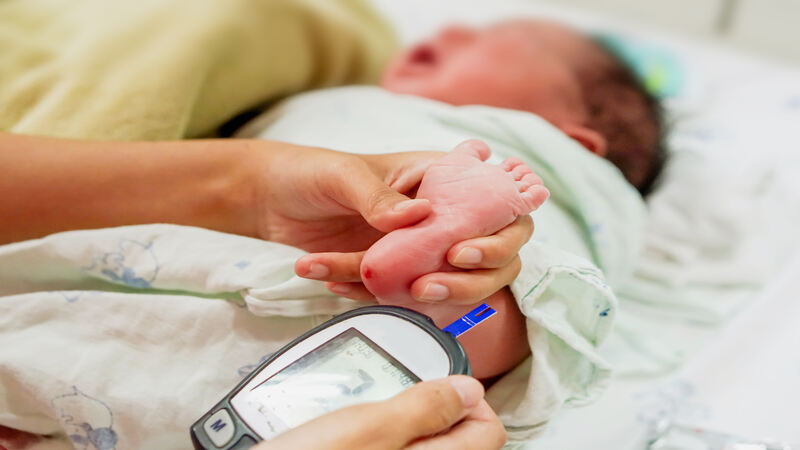 Most pregnancies proceed without any serious complications, while some expecting moms can experience a few hindrances. A few such issues appear only in the course of pregnancy and resolve after delivery. Adding to the long list of dos and don’ts during pregnancy, unexpected medical issues can complicate it.
Most pregnancies proceed without any serious complications, while some expecting moms can experience a few hindrances. A few such issues appear only in the course of pregnancy and resolve after delivery. Adding to the long list of dos and don’ts during pregnancy, unexpected medical issues can complicate it.
Developing Gestational Diabetes is one such complication that can stress any woman. Keep reading to discover more about the causes, symptoms and the effective ways to deal with them.
What Is Gestational Diabetes?
Gestational Diabetes is a condition that occurs when your blood sugar (glucose) is too high during pregnancy [1]. Women who have never been diagnosed with diabetes before develop it during their pregnancy. Most of the time, gestational diabetes goes away after delivery, but it can raise the odds of your baby getting type 2 diabetes in the future [2].
Symptoms Of Gestational Diabetes
 Most of the time, gestational diabetes remains undetected due to unnoticeable symptoms. A lot of pregnant women learn about this condition during screening for gestational diabetes [3]. A few common symptoms due to high sugar levels in the blood include:
Most of the time, gestational diabetes remains undetected due to unnoticeable symptoms. A lot of pregnant women learn about this condition during screening for gestational diabetes [3]. A few common symptoms due to high sugar levels in the blood include:
- Fatigue or tiredness.
- Increased thirst [4].
- Need to pee frequently.
- Dry mouth.
- Blurring vision
- Genital itching or thrush [5].
Most of the symptoms, like fatigue and excessive peeing, are typical during pregnancy. Therefore, it is always better to consult your physician regarding any escalation in the above symptoms.
How Does Having Gestational Diabetes Affect My Pregnancy?
Gestational diabetes should be managed as early as possible, as it can lead to health issues for both the mother and the baby.
It increases the risk of:
- Premature delivery: Premature delivery is more common among mothers with untreated gestational diabetes [6].
- Miscarriage: Gestational diabetes during the initial months of pregnancy can lead to miscarriage [7].
- Preeclampsia: Gestational diabetes is mostly accompanied by high blood pressure and preeclampsia [8].
- Future diabetes
How Does Gestational Diabetes Affect My Baby?
 As an outcome of gestational diabetes that is left untreated or uncontrolled, the fetus could develop issues, including:
As an outcome of gestational diabetes that is left untreated or uncontrolled, the fetus could develop issues, including:
- Macrosomia: Macrosomia refers to the condition when the baby is significantly larger than what is considered normal for the gestation period [9]. This happens when the extra glucose of the mother (experiencing gestational diabetes) crosses the placenta, leading to high blood glucose levels in the fetus. This prompts the child’s pancreas to produce more insulin. Since the child is getting more calories than it needs to develop and build up, the additional calories are put away as fat deposits, making the baby grow too big.
- Hypoglycemia: Sometimes babies develop low blood sugar (hypoglycemia) not long after birth, as their own insulin level is significantly high – but the excess supply of sugar has been cut off now [10]. In extreme cases, the condition of hypoglycemia may induce seizures in the newborn
- Preterm birth and respiratory distress: Gestational diabetes increases the chances of preterm birth. Babies born prematurely experience issues with breathing.
- Type 2 diabetes and obesity in the future: Babies born to a mother with gestational diabetes are at higher risk of becoming obese and developing type 2 diabetes in the future [11].
Who Is At The Risk Of Getting Gestational Diabetes?
Around 5 percent of all expecting mothers get gestational diabetes [12]. However, some expecting mothers are at greater risk of developing gestational diabetes if:
- Age is more than 25 years
- Close relatives (like mother and sister) have type 2 diabetes
- History of gestational diabetes
- Obesity [13].
- Low pre-pregnancy physical activity [14]
- Polycystic ovarian syndrome [15]
Top Ways To Deal With Gestational Diabetes
 Getting the diagnosis of gestational diabetes can be worrisome for a lot of pregnant women. Instead of stressing yourself out, there are many natural ways or habits that you can adapt to deal with it.
Getting the diagnosis of gestational diabetes can be worrisome for a lot of pregnant women. Instead of stressing yourself out, there are many natural ways or habits that you can adapt to deal with it.
A few lifestyle changes include:
- Eating regularly: It is really important to take frequent meals during pregnancy. Avoid skipping any meal and have healthy snacks between the meals.
- Cut down on sugar: Excessive sugar intake is the main culprit when it comes to gestational diabetes. Avoid fizzy drinks and processed foods as they contain loads of sugar.
- Appropriate portion size: You need to watch your portion size and avoid overeating. A lot of women believe in the “Eat for two” theory. But sadly, that is not true.
- Regular exercises: It is always better to stay active during pregnancy, unless your doctor has advised you to rest. Simple exercise, like walking for 30 minutes a day can help control your blood sugar levels [16]. Stretching exercises and prenatal yoga can be beneficial too.
- Maintain hydration: Make sure that you take enough water throughout the day, as it helps in maintaining blood sugar levels.
- Avoid stress: Unnecessary stress must be kept at bay during pregnancy. Practice deep breathing exercises regularly to keep yourself calm.
- Monitor blood sugar: Checking blood sugar levels at regular intervals is necessary to avoid any complications. You can keep a glucometer at home to monitor your blood glucose levels.
- Medicines: Depending on your blood glucose levels, your doctor will advise you on drugs to reduce blood sugar levels or insulin [17]. Make sure you take the doses regularly.
Dietary Recommendations For Gestational Diabetes
Diet plays a vital role when it comes to maintaining blood sugar levels. A healthy diet can do wonders for dealing with Gestational Diabetes. A few recommendations are:
- Avoid skipping meals during pregnancy. Instead, take frequent meals with healthy snacks in between.
- Stay away from sweets and desserts. Also, avoid any added sugar, like honey or syrups.
- Increase the intake of healthy fruits and vegetables. Avoid processed and refined food as they are loaded with carbohydrates.
- Avoid foods with a high glycemic index, as they are absorbed quickly in the body and raise blood sugar quickly [18]. Instead, opt for foods with a low glycemic index, like oats, brown rice, wholegrain pasta and noodles, etc.
In case you are having trouble choosing the right food for you, you can consult a dietician who can help you plan a well-balanced diet chart.
What Happens If Gestational Diabetes Is Not Controlled?
 Uncontrolled gestational diabetes can lead to certain maternal and fetal complications. Some of them include:
Uncontrolled gestational diabetes can lead to certain maternal and fetal complications. Some of them include:
- Need for a cesarean section due to a large baby.
- Preeclampsia
- Miscarriage or stillbirth.
- Risk of Type 2 Diabetes Mellitus in both the mother and the baby later in life [19].
- Premature birth
- Low blood sugar in the baby just after birth.
You may find it hard to cope with gestational diabetes at first. Dealing with cravings while adhering to a stringent diet and giving up on the food you love might be challenging. Motivating yourself for physical activities can seem daunting, especially when you are tired and feeling clumsy. However, maintaining fitness and following a healthy lifestyle are critical for a healthy pregnancy.
FAQ’s
1. How Do I Control My Gestational Diabetes?
Maintaining a healthy lifestyle is crucial to controlling gestational diabetes. Focus on a healthy diet and stay away from sweets and junk food. Staying active is another key to controlling Gestational Diabetes.
2. Will My Baby Be Okay If I Have Gestational Diabetes?
Most women with gestational diabetes give birth to healthy babies. Untreated and poorly controlled blood sugar levels during pregnancy can elevate the risks of hypoglycemia and breathing difficulties in the newborn.
3. What Are The Best Practices For Gestational Diabetes?
Including frequent health meals in your diet along with regular exercise can play an important role in controlling gestational diabetes. Make sure that you monitor your blood glucose regularly and take your medicines or insulin on time.
4. How To Lower Blood Sugar While Pregnant?
Consuming a lot of fiber in the form of healthy fruits and vegetables, along with proper hydration and regular activities, can help lower blood sugar levels during pregnancy. A lot of pregnant women might need oral hypoglycemic drugs or insulin to lower high blood glucose levels.
References
- Gestational diabetes – [https://www.nhs.uk/conditions/gestational-diabetes/]
- H. David McIntyre, Patrick Catalano, Cuilin Zhang, Gernot Desoye, Elisabeth R. Mathiesen & Peter Damm Nature Reviews Disease Primers volume 5, Article number: 47 (2019) – [https://www.nature.com/articles/s41572-019-0098-8]
- Hollander, Martine H. MD*; Paarlberg, K Marieke MD, PhD†; Huisjes, Anjoke J. M. MD†. Gestational Diabetes: A Review of the Current Literature and Guidelines. Obstetrical & Gynecological Survey 62(2):p 125-136, February 2007 – [https://journals.lww.com/obgynsurvey/abstract/2007/02000/gestational_diabetes__a_review_of_the_current.25.aspx]
- Mandal, Ananya. (2023, July 04). Diabetes Pathophysiology. News-Medical. Retrieved on July 22, 2024 from https://www.news-medical.net/health/Diabetes-Pathophysiology.aspx – [https://www.news-medical.net/health/Diabetes-Pathophysiology.aspx]
- Diabetes.co.uk Comment Policy- Genital Itchiness – [https://www.diabetes.co.uk/symptoms/genital-itching.html]
- Preda A, Iliescu DG, Comănescu A, Zorilă GL, Vladu IM, Forțofoiu MC, Țenea-Cojan TS, Preda SD, Diaconu ID, Moța E, Gheorghe IO, Moța M. Gestational Diabetes and Preterm Birth: What Do We Know? Our Experience and Mini-Review of the Literature. J Clin Med. 2023 Jul 9;12(14):4572 – [https://www.ncbi.nlm.nih.gov/pmc/articles/PMC10380752/]
- School of Public Health, Tongji Medical College, Huazhong University of Science and Technology, Wuhan 430030, Hubei, China – [https://www.sciencedirect.com/science/article/abs/pii/S0168822722010385]
- Department of Gastroenterology, Shengjing Hospital of China Medical University, Shenyang, China ; Department of Endocrinology, Shengjing Hospital of China Medical University, Shenyang, China; Clinical Skills Practice Teaching Center, Shengjing Hospital of China Medical University, Shenyang, China – [https://www.frontiersin.org/journals/cardiovascular-medicine/articles/10.3389/fcvm.2022.831297/full]
- Department of Obstetrics and Gynecology, The First Affiliated Hospital of Chongqing Medical University, Chongqing, PR China. – [https://pubmed.ncbi.nlm.nih.gov/26045324/]
- STANFORD MEDICINE CHILDREN’S HEALTH – [https://www.stanfordchildrens.org/en/topic/default?id=hypoglycemia-in-a-newborn-baby-90-P01961]
- AskMayoExpert. Hyperglycemia and diabetes mellitus (child). Mayo Clinic; 2020 – [https://www.mayoclinic.org/diseases-conditions/type-2-diabetes-in-children/symptoms-causes/syc-20355318]
- Singh S, Yadav M. Gestational Diabetes Mellitus among Pregnant Women Delivering in a Tertiary Care Hospital: A Descriptive Cross-sectional Study. JNMA J Nepal Med Assoc. 2022 Mar 11;60(247):229-233 – [https://www.ncbi.nlm.nih.gov/pmc/articles/PMC9226727/]
- Orós, M., Perejón, D., Serna, M.C. et al. Prevalence and risk factors of gestational diabetes in the health region of Lleida: a retrospective observational cohort study. J Endocrinol Invest 46, 2639–2646 (2023)- [https://link.springer.com/article/10.1007/s40618-023-02120-5]
- Amiri FN, Faramarzi M, Bakhtiari A, Omidvar S. Risk Factors for Gestational Diabetes Mellitus: A Case-Control Study. Am J Lifestyle Med. 2018 Aug 9;15(2):184-190 – [https://www.ncbi.nlm.nih.gov/pmc/articles/PMC7958210/]
- Conquerpcos – [https://conquerpcos.org/all-about-pcos/gestational-diabetes-in-pcos-and-risk/]
- Padayachee C, Coombes JS. Exercise guidelines for gestational diabetes mellitus. World J Diabetes. 2015 Jul 25;6(8):1033-44 – [https://www.ncbi.nlm.nih.gov/pmc/articles/PMC4515443/]
- Oded Langer, Akolisa Anyaegbunam, Lois Brustman, Denise Guidetti, Roger Mazze, Gestational diabetes: Insulin requirements in pregnancy, American Journal of Obstetrics and Gynecology, Volume 157, Issue 3,
1987, Pages 669-675, ISSN 0002-9378,-[https://www.sciencedirect.com/science/article/abs/pii/S0002937887800261] - Canadian Diabetes Association – [https://www.diabetes.ca/resources/tools—resources/the-glycemic-index-(gi)]
- Damm P. Future risk of diabetes in mother and child after gestational diabetes mellitus. Int J Gynaecol Obstet. 2009 Mar;104 Suppl 1:S25-6 – [https://pubmed.ncbi.nlm.nih.gov/19150058/]
